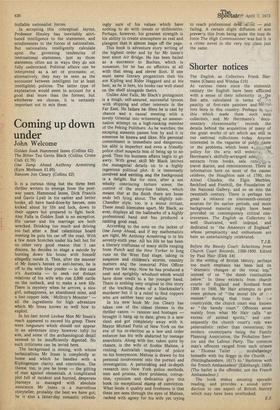Shorter notices
The English as Collectors Frank Harmann (Chatto and Windus £10) At various times since the sixteenth century the English have been afflicted with a sense of their inferiority in ..the fine arts, calculated in terms or paucity of first-rate painters and JAI tors born in this country. Perhaps itj this which made them such aviu. collectors, and Mr Herrmann's 'docu mentary chrestomathy ' records the details behind the acquisition of many of the great works of art which are still in our national collections today. Anyone interested in the vagaries of publ4 ,-)taste or the problems which beset a policy for the arts will welcc.., Herrmann's skilfully-arranged sele14, extracts from books, sale catili.,',31 p, travel diaries, and reminiscences. There is . information here on most of the causes celebres, the Houghton sale of 1780, the Altieri Claudes, the Elgin Marbles, Beckford and Fonthill, the Foundation of the National Gallery, and so on into the . twentieth century. There is perhaps too great a reliance on nineteenth-century sources for the earlier periods, and more background material might have 'been provided on contemporary critical controversies. The English as Collectors is well illustrated, well indexed, and dedicated to 'the Amateurs of England' whose perspicacity and enthusiasm are here so entertainingly celebrated.
T.J.B. Before the Bawdy Court: Selections from Church Court Records, 1300-1800. Edited by Paul Hair (Elek £4) In the writing of British history, perhaps too much emphasis has been laid on "dramatic changes at the vocal top," instead of on "the dumb continuities below." In these extracts from church courts of England and Scotland from 1300 to 1800, MT Hair attempts to give some picture of "the moral life of * masses" during that time. In countryside, the church court was known as "the bawdy court." Offences arose mainly from what Mr Hair calls "an excess of animal spirits," and consequently the church court's role was paternalistic rather than censorious; its modern counterparts being the Family Planning Association, the Probation Service and the Labour Party. The common man's offences ranged from such crimes as 'Thomas Tailer . misbehavinge himselfe with his dogge in the Church ...' (Nottinghamshire, 1617) to ' Harlotrie with the French Ambassadeur' (Edinburgh, 1566). (The harlot is the offender, not the French Ambassadeur.) The book makes amusing sporadic reading, and provides a sound introduction to one aspect of British history which may have been overlooked.
E.S.


































 Previous page
Previous page